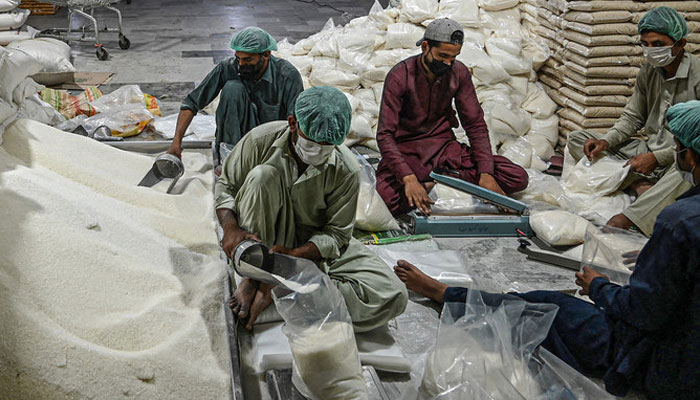Sugar exports hinge on Rs140/kg price cap for domestic market
LAGHORE: The government has asked sugar millers to keep the sugar price at Rs140 per kilogram to obtain permission for exports, following lobbying by representatives in parliament and the Economic Advisory Council (EAC), officials said.
The move comes as millers claim Rs40 billion in growers' payments are due, with 40 sugar mills facing default if exports are not allowed. However, officials said the claim appears incorrect, as Rs484 billion in payments has already been made by millers out of Rs497 billion from the last crushing season.
Punjab is the largest sugar producer and produces almost 60 percent, Sindh 35 percent, and KP only 5 percent of the total sugar of the country. Furthermore, out of 41 sugar mills in Punjab, 22 have already made 100 percent of the payments to the growers. Similarly, sugar prices remained stable during the seasons. They have witnessed a marginal increase of Rs 10-12 per kilogram since 25 November 2023, when the sugarcane crushing season started.
However, officials said that the government’s demand to keep the sugar price at Rs140 per kilogram throughout the year would not be possible if sugar exports were allowed.
An industry offcial sad that Afghanistan-based traders are offering USD600 per tonne for Pakistani sugar. "If the exchange rate is calculated at 278/USD, then the sugar price without tax reaches Rs166.80 per kg," the offcial added. "After adding taxes, it would be Rs196.82 per kilogram. This means the sugar price in the local market will cross the Rs200 per kilogram benchmark within a week."
Moreover, the exportable surplus sugar stocks number of 1.5 million tonnes quoted to the government is also incorrect, the official said.
It is estimated that by the start of the next crushing season, the surplus might be between 250,000 to 300,000 tonnes. "Thus, the decision to allow surplus sugar stocks should be made at the start of the next crushing season and continue until the month of February in order to avoid any chaos created due to exports in the past."
The claim of 40 sugar mills facing default is also not supported by recent years' growth in the industry, with almost all sugar mills increasing their sugarcane crushing capacities 2-3 times and new sugar mills being established without default.
Similarly, more than 97 percent of payments to the growers have been made in Punjab, with less than 20 mills left to complete their payments, while the majority of these remaining payment mills have also made over 90 percent of payments to the growers.
Further, in Sindh, growers’ payment issues are never reported, while their payments are always made side by side due to a high recovery level. The issue of grower’s payments has always surfaced in Punjab only.
The industry official believed those who made the wrong decision to buy sugarcane at much higher rates to maintain these mills’ production capacities must face their own folly. "Now they are creating schemes to generate windfall profits by getting sugar exports permission, which leads to a big push in the local sugar prices as well."
A sugar production costing study conducted by NUST estimated the average sugar production cost in Punjab at Rs87.32 and Rs90.07 for Sindh, with the ex-mill price after adding taxes and a 15 percent profit margin estimated at Rs116.14 and Rs119.79, respectively.
The report pointed out that sugar mills used different leverages for cost manipulation, including sucrose recovery percentage, sugarcane cost, finance cost, by-products, and sales tax calculations.
-
 World Is ‘dangerously Underprepared’ For Surge In Extreme Heat, Scientists Warn
World Is ‘dangerously Underprepared’ For Surge In Extreme Heat, Scientists Warn -
 EU Commission Set To Open Proceedings Against Grok Today
EU Commission Set To Open Proceedings Against Grok Today -
 Brooklyn Beckham Ruthlessly Called Out By Comedian Amid Beckham Family Feud
Brooklyn Beckham Ruthlessly Called Out By Comedian Amid Beckham Family Feud -
 Prince Harry, Meghan Markle Disturb William’s Peace With Major Move
Prince Harry, Meghan Markle Disturb William’s Peace With Major Move -
 ChatGPT Model GPT-5.2 Draws On Elon Musk’s Grokipedia As Source, Tests Reveal
ChatGPT Model GPT-5.2 Draws On Elon Musk’s Grokipedia As Source, Tests Reveal -
 King Charles Quietly Considering 'dramatic, Deeply Personal' Move For Meghan Markle, Prince Harry
King Charles Quietly Considering 'dramatic, Deeply Personal' Move For Meghan Markle, Prince Harry -
 Ethiopia Declares Itself Marburg Virus Free
Ethiopia Declares Itself Marburg Virus Free -
 Cristin Milioti Shares Disappointing Update About 'Penguin' Season 2
Cristin Milioti Shares Disappointing Update About 'Penguin' Season 2 -
 King Charles Makes Unreasonable Demand Of Kate Middleton In Shock Move
King Charles Makes Unreasonable Demand Of Kate Middleton In Shock Move -
 Princess Kate Shows 'unique Superpower' With Major Health Update
Princess Kate Shows 'unique Superpower' With Major Health Update -
 Indonesia: Search Operation Continues After Landslide Kills At Least 30, Leaving 100 Missing
Indonesia: Search Operation Continues After Landslide Kills At Least 30, Leaving 100 Missing -
 Ariana Grande, Cynthia Erivo Given Scathing Review By Oscars Voter
Ariana Grande, Cynthia Erivo Given Scathing Review By Oscars Voter -
 Royal Experts React As Meghan Markle Faces Major Hollywood Blow
Royal Experts React As Meghan Markle Faces Major Hollywood Blow -
 ‘Canada Trade Deal Isn't Zero-sum Game’: China Responds After US Tariff Threat
‘Canada Trade Deal Isn't Zero-sum Game’: China Responds After US Tariff Threat -
 Maren Morris Teases Musical Collab With Ex Ryan Hurd 2 Years After Split
Maren Morris Teases Musical Collab With Ex Ryan Hurd 2 Years After Split -
 Plastic Surgeon Reveals Skincare That Will Make You ‘three To Five Years’ Younger
Plastic Surgeon Reveals Skincare That Will Make You ‘three To Five Years’ Younger




